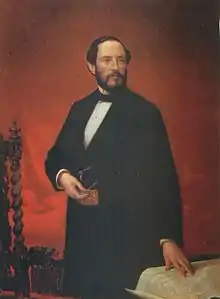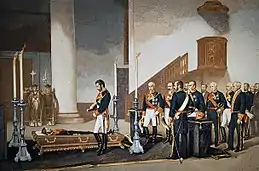Juan Prim
Juan Prim y Prats, 1st Count of Reus, 1st Marquess of los Castillejos, 1st Viscount of Bruch (Spanish pronunciation: [ˈxwam ˈpɾin i ˈpɾats], Catalan: Joan Prim i Prats [ʒuˈam ˈpɾim i ˈpɾats]; 6 December 1814 – 30 December 1870) was a Spanish general and statesman[2] who was briefly Prime Minister of Spain until his assassination.[3]
Juan Prim | |
|---|---|
 Portrait by Luis Madrazo | |
| Prime Minister of Spain | |
| In office 18 June 1869 – 27 December 1870 | |
| Monarch | Francisco Serrano y Domínguez |
| Preceded by | Francisco Serrano y Domínguez |
| Succeeded by | Juan Bautista Topete |
| Captain General of Puerto Rico | |
| In office 1847–1848 | |
| Preceded by | Rafael de Aristegui y Velez |
| Succeeded by | Juan de la Pezuela y Cevallos |
| Personal details | |
| Born | Anton Joan Pau Maria Prim[1] 6 December 1814[1] Reus, Spain |
| Died | 30 December 1870 (aged 56) Madrid, Spain |
| Nationality | Spanish |
| Political party | Progressive |
| Profession | Politician |
| Signature | |
| Military service | |
| Branch/service | Army |
| Years of service | 1834–1868 |
| Rank | General |
| Battles/wars | Glorious Revolution First Carlist War Crimean War |
| Awards | Laureate Cross of Saint Ferdinand (3) Order of the Medjidie |
Biography
.jpg.webp)
Prim was the son of lieutenant colonel Pablo Prim.[n. 1] He entered the free corps known as the volunteers of Isabella II in 1834, and in the course of the First Carlist War he rose to the rank of lieutenant-colonel and had two orders of knighthood conferred upon him. After the pacification of 1839, as a progressist opposed to the dictatorship of General Espartero, he was sent into exile. However, in 1843 he was elected deputy for Tarragona, and after defeating Espartero at Bruch he entered Madrid in triumph with General Serrano. The regent Maria Christina promoted him major-general, and made him conde de Reus (Count of Reus) and vizconde del Bruch (Viscount of Bruch).[5]
General Narváez, the prime minister, failed to understand what constitutional freedom meant, and General Prim, on showing signs of opposition, was sentenced to six years' imprisonment in the Philippine Islands. The sentence was not carried out, and Prim remained an exile in England and France until the amnesty of 1847. He then returned to Spain, and was first employed as captain-general of Puerto Rico (Governor of Puerto Rico) and afterwards as military representative with the sultan during the Crimean War. In 1854 he was elected to the cortes, and gave his support to General O'Donnell, who promoted him lieutenant-general in 1856. In the war with Morocco he did such good service at Castillejos (Fnideq), Cabo Negro, Guad al Gelu and Campamento in 1860 that he was made marqués de los Castillejos (Marquess of los Castillejos) and Grande de España (Grandee of Spain).[5]
Prim commanded the Spanish expeditionary army in Mexico in 1862, when Spain, Great Britain, and France sought forced payment from the liberal government of Benito Juárez for loans. Prim was a sympathizer with the Mexican liberal cause, thus he refused to consent to the ambitious schemes of French emperor Napoleon III, and withdrew Spanish forces following a meeting with Manuel Doblado.[6]
On Prim's return to Spain he joined the opposition, heading pronunciamentos in Catalonia against generals Narváez and O'Donnell. All his attempts failed until the death of Narváez in April 1868, after which Queen Isabella became increasingly tyrannical, until at last even Serrano was exiled. In September 1868 General Serrano and General Prim returned, and Brigadier Topete, commanding the fleet, raised the standard of revolt at Cádiz. In July 1869 General Serrano was elected regent, and Prim became president of the council and was made a marshal.
On 6 November 1870 Amadeo, Duke of Aosta, was elected king of Spain, but General Prim, on leaving the chamber of the Cortes on 28 December, was shot by unknown assassins and died two days later.[7][8] The Cortes took his children as wards of the country; three days afterwards King Amadeo I swore in the presence of the corpse to observe the new Spanish constitution.[5] This is due to the fact that Prim had searched all the European courts of the time trying to find a monarch who was not opposed to being democratically elected. He is quoted for saying that "looking for a democratic monarch in Europe is like trying to find an atheist in heaven". After France had rejected the almost elected Leopold of Hohenzollern because of their fear that Prussia might thereby become more powerful, Amadeo of Savoy was the most fitting who consented.
The workshop of metalworker Plácido Zuloaga was commissioned to make a monumental sarcophagus for Prim. Completed in 1875 in Eibar, this now resides in the cemetery at Reus.[9]
Gallery
 Monument to Prim sculpted by Josep Llimona in Reus
Monument to Prim sculpted by Josep Llimona in Reus Assassination of Juan Prim (drawing by Pierre Méjanel)
Assassination of Juan Prim (drawing by Pierre Méjanel) "Amadeo I in front of the coffin of General Prim (1870)" by Antonio Gisbert
"Amadeo I in front of the coffin of General Prim (1870)" by Antonio Gisbert
See also
- List of unsolved murders
References
- Informational notes
- According to W.O Cavenagh (1898), writing for The Genealogical Magazine, Juan Prim was a descendant of John Prim, of Johnswell, county Kilkenny (d. 1755), an Irish descendant of a family of Dutch settlers originally surnamed Prime, established in England during the reign of Elizabeth I and a branch of which relocated to Ireland during the reign of Charles I. A descendant of Mark (d. 1782)—eldest son of John and his first wife Miss Rodgers—would have migrated to Spain, made a fortune and founded the Spanish branch.[4]
- Citations
- Baptism inscription
- "Juan Prim | Spanish statesman". Encyclopedia Britannica. Retrieved 2019-11-14.
- "Juan Prim, 1st Marquis of los Castillejos – Facts, Bio, Family, Life, Info". Retrieved 2019-08-30.
- Cavenagh, W.O (July 1898). "The Prims of Johnswell: An Episode of the Irish Wars". The Genealogical Magazine: 91–94.
- Chisholm 1911.
- Brian Hamnett, Juárez, New York: Longmans 1994, pp. 169, 278.
- "Juan Prim, 1st Marquis of los Castillejos – Facts, Bio, Family, Life, Info". Retrieved 30 August 2019.
- Baynes, Thomas Spencer (1891). The Encyclopædia Britannica: A Dictionary of Arts, Sciences, and General Literature. M. Sommerville.
- Lavin, James D. (1997). The art and tradition of the Zuloagas : Spanish damascene from the Khalili Collection. Oxford: Khalili Family Trust in association with the Victoria and Albert Museum. p. 58. ISBN 1-874780-10-2. OCLC 37560664.
- Bibliography
- Chisholm, Hugh, ed. (1911). . Encyclopædia Britannica (11th ed.). Cambridge University Press.
- Further reading
- Blairet, Louis (1867). Le Général Prim et la situation actuelle de l'Espagne. Paris.
- Guillaumot (1870). Juan Prim et l'Espagne. Paris.
- Guited, Gimenez y (1860). Guited, Historia militar y política del General Don Juan Prim. Barcelona.
- Léonardon, Henri (1901). Prim. Paris. (in French, contains a useful bibliography).
- Schurz, Carl (1907). "Chapter 6". Reminiscences. II. New York: McClure Publ. Co. pp. 293–297. (Schurz was the United States' ambassador to Spain in 1860. In his Reminiscences, he gives a short biography of Prim up to that time as well as his recollections of his own talks with Prim and the Spanish court).
External links
- Map (1866) of the approximate route of Prim from Ocaña to Portugal.
| Wikimedia Commons has media related to Juan Prim. |
| Preceded by Rafael De Aristegui y Velez |
Governor of Puerto Rico 1847-1848 |
Succeeded by Juan De La Pezuela y Cevallos |
| Preceded by Francisco Serrano y Domínguez, Duke de la Torre |
Prime Minister of Spain 1868-1869 |
Succeeded by Juan Bautista Topete y Carballo |
